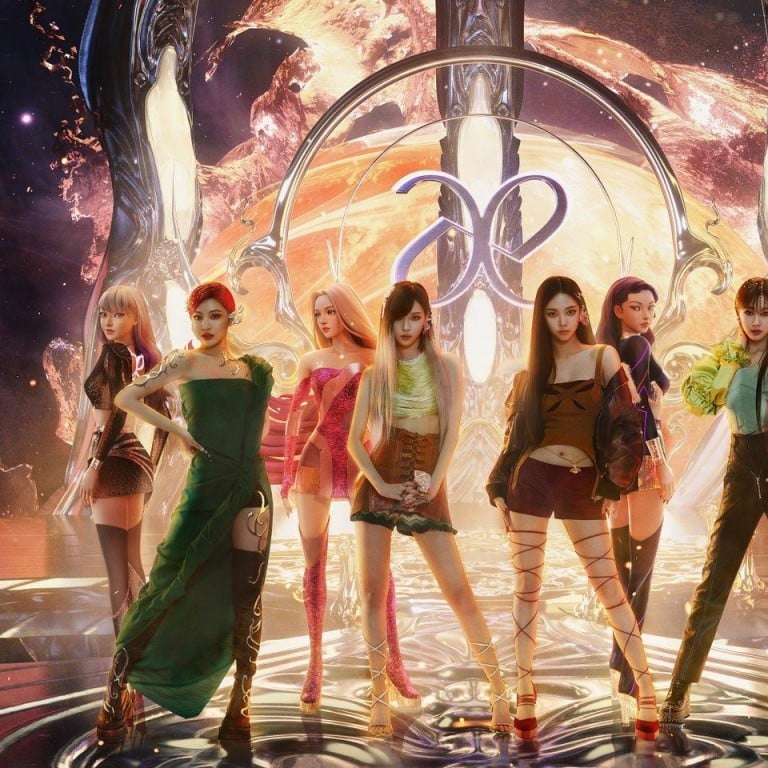
K-pop’s virtual future: Aespa, Eternity, the rise of digital performers and the AI technology that allows stars to perform as avatars
- K-pop group Aespa, which has both physical and virtual members, had one of the biggest hits so far this year
- Eternity are an 11-piece virtual girl group created using AI technology from a start-up, Pulse9
Aespa are far from the only K-pop act to incorporate virtual avatars in their musical projects. On March 22, an 11-member girl group, Eternity, released their single I’m Real. Eternity is said to be the first K-pop group created using artificial intelligence (AI) – formed by the Seoul-based tech start-up Pulse9.
Pulse9’s goal is to create a virtual avatar mask of sorts for creatives who, for whatever reason, don’t or can’t show their faces on camera but still want an online personification to show the world.

While not quite lifelike, the realistic feeling is just about there when you watch the music video for I’m Real – and is real enough for some to call Eternity a “deepfake” K-pop group, evoking a term typically used when referring to pornographic content in which individuals’ faces or bodies are virtually embedded without their knowledge.
“I prefer the term deep-real to deepfake, because our technology is used in a way I believe is genuine enhancement of human talent and expression,” says Jieun Park, the CEO of Pulse9.
Aespa’s Black Mamba hits 100 million views, makes YouTube history
“I think technology is a neutral power. People can abuse their power with technology, but I still think AI can be used for good and we want to try and help make technology used for a good cause become more well-known and appreciated, to clean the reputation of AI [characters].”
Park adds: “This is a very new industry and a lot of countries are creating new regulations, and we’re hoping that our technology will help the authorities make regulations [regarding realistic virtual characters] with us.”
Pulse9 started with a K-pop act because virtual avatar performers are not dissimilar as an idea to K-pop stars or, more generally, actors, in that they are not typically entirely in creative control. Just as many pop stars and actors don’t write their own songs or scripts, or direct their own performances, there are creatives offstage and off-camera who facilitate their performance.
Park and her team have launched Eternity to serve as an example of how to create performance art without actually having to perform. For Park, who has been a fan of K-pop for many years now, the project is her attempt to create a pathway to bring the industry into a new technological realm, but not remove its essential aspects.
“I think the idol syndrome is one of the biggest cultural experiences for [people]. I noticed the energy and power given by the K-pop scene to [people] around the world, so I wanted to give more people that channel to move the world,” she says.
She sees Eternity as an animated alternative to K-pop idols the same way cartoons are an alternative to live-action films or television shows; not a replacement, but an enhancement that enables more people to engage with the industry as creators behind stars based on human talent, without the physical burden of performing.
K-pop label’s big plans for NCT, Aespa and other acts in 2021
“Our idols are absolutely controlled by the human artist behind them, and thus we believe we are giving the real human artists another tool instead of their biological body or face,” she explains, adding that all of the music and dance performances featured in I’m Real were provided by performers on a pro bono basis.
“They can even create 10 different characters. You can run many different idols yourself, depending on the way you want to express yourself,” she adds.
Heyonn Mot, Pulse9’s CVO, says the technology they’re working on making available to creators will provide a new platform for artistry in the increasingly digital world we live in.
Covid-19 infection, contact force K-pop groups to quarantine
Eternity was a great example to showcase its potential because of how limited the K-pop industry is with its intense focus on physicality.
“K-pop idols, they’re part of the happy few that are selected by entertainment companies, while there are really a lot of other creators and talents in the world who never have the chance to be selected,” reflects Mot.
“Or maybe it’s a privacy issue, that they want to keep their private life private, so don’t want to show their face. Or maybe they have mobility issues, or any other sort of issues which really don’t allow them to go into public.”
Beyond those individuals who, for whatever reason, are not able to be in-person K-pop idols or any other sort of performer, Pulse9 also sees a use of its technology for celebrities or other public figures who may want a virtual counterpart.
“For idols, like real K-pop idols, sometimes their identity equals their idol identity, which is maybe not always the same. So we want to also provide them with a chance that they can live their private life and also have their entertainer life,” Mot says.
It is unclear to what extent the ownership and regulation of virtual counterparts such as Aespa’s will be controlled by real-life celebrities who have management or licensing deals with media companies, but as Jun says, laws will likely be developed in years to come.
“Eternity is about making a dream come true, because you can be an idol while keeping your own self,” adds Mot. “You don’t need plastic surgery, perfect make-up, etc. This is liberation somehow. If our virtual idol, Eternity, can make it to the idol stage, then we believe it’s a message to everyone that everyone can succeed,” says Mot.
One term that Park and Mot bring up is the idea of a “metaverse”, which is increasingly becoming a popular element in South Korea’s entertainment industry. “The metaverse is a parallel to this world, a wholly virtual world, while our world is the connection between reality and the metaverse through humans,” says Jun.
On Thursday, South Korea’s top science university, KAIST, announced it was joining forces with SM to develop metaverse technology as it creates roster-wide storytelling, known as the SMCU, similar to the Marvel Cinematic Universe.
K-pop rapper Ravi on new album Roses, working with Boyz II Men
Other entertainment, tech and media entities in South Korea are investing in what could be a new realm in which fans and stars connect completely digitally, either featuring real individuals behind a screen or using artificial intelligence to create wholly virtual content.
Virtual individuals are appearing in other fields, with Samsung’s rumoured virtual assistant Samantha and virtual performer Apoki getting a lot of attention in South Korea.
